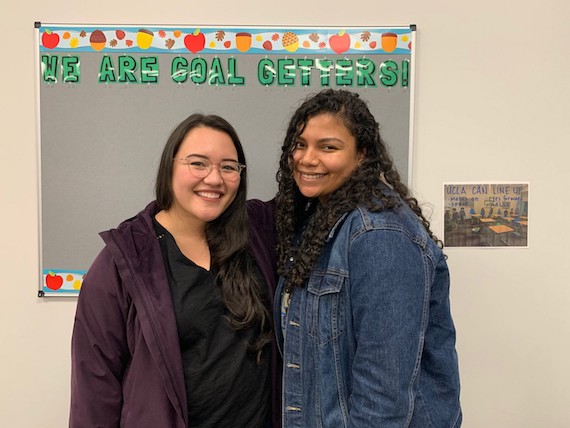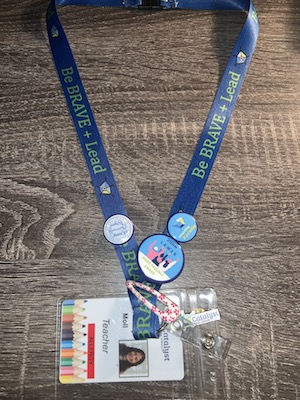
Angela Reyes and Brittany Moll say it’s kismet that they became co-teachers at Catalyst, a charter public school serving families in Kitsap County. Both originally from the Bay Area, they now happen to be next door neighbors and fast friends after they met earlier this year. When asked what grade they teach, both said brightly and in unison, “Kindergarten,” and then they laughed.
Co-Teaching, professional development and the Catalyst values
At Catalyst, teachers work in co-teaching units to support a classroom. The school founders, Amanda Gardner and Tatiana Epanchin, were very intentional in how they built their team – including how they partnered teachers. As Angela and Brittany got to know each other, it was clear that their fit as co-teachers was undeniable.
“We have so much in common,” said Brittany.
“We even have the same grocery lists,” Angela added. “With Brittany, I feel like she was planted here and told all the right answers to all of these important questions for me. I’m so thankful that we were paired together, Tatiana and Amanda did an awesome job with that.”
Catalyst opened the virtual doors to their inaugural scholar classes in September, and in person in early November. When it became clear that they were starting the year with distance learning, school leaders pushed the start date back to ensure every Catalyst teacher and staff person was well prepared.
Teachers had six weeks of planning and training before they welcomed scholars to their first class. In that time, not only did Angela and Brittany learn the technical tools and curriculum they would be using for the year, they dove into team-building and self-work.
“Our first day of Professional Development, we shared more about our identity and who we are,” said Angela. “We told our stories and through this process I became very comfortable bringing my whole self to Catalyst.”
“One of Catalyst’s core values is vulnerability,” added Brittany. “Right,” Angela agreed. “We would bring our whole selves to PD by consistently sharing parts of our lives and stories with our colleagues. Practicing vulnerability helped us bond as a team and get in the habit of speaking our truth.”
Catalyst offers ongoing professional development including full staff meetings weekly. Here teachers across the school may support one another for more successful outcomes in every class. The initial bonding period built into the professional development structure has created a culture of trust amongst the Catalyst staff. That trust benefits scholars as teachers work together to problem solve and design lessons that are relevant, inclusive and engaging for their scholars.
“I’ve never felt comfortable in other teams bringing up race or equity issues, but here, I don’t hesitate,” said Angela.
Equity in the Classroom
Feeling comfortable with conversations around equity, race, class, gender, ability and more is a key value that brought both Angela and Brittany to Catalyst.
“Some schools have a lot of erasure in their curriculum. Teachers aren’t even allowed to talk about race,” said Brittany. “Catalyst not only allows these conversations; they are encouraged and celebrated.”
For Brittany, who saw racial inequities in education for both her and her brother, building an inclusive educational space is a deeply held commitment. She didn’t have a Black teacher until she was in 10th grade, and to her that was unacceptable.
Brittany always loved working with kids growing up – volunteering at libraries and tutoring in high school and college. But it wasn’t until she dove into her coursework at UCLA that she knew she wanted to pursue a career in education. With a major in sociology and a minor in disability studies, Brittany learned more about the inequities students face in the education system, as well as the lack of representation.
“Me being in this field makes a difference,” said Brittany. “My scholars get to see someone right off the bat that looks like them, a teacher who is a Person of Color.”
One of the main things that attracted Brittany to Catalyst was the student-centered learning approach. “It shouldn’t be me holding all the power and knowledge, it should be about sharing knowledge. A student-centered approach gives our scholars more autonomy and makes space in the classroom for their ideas and contributions. That way, we can learn from one another and both educators and students play an equal role in their education.”
Angela concurs. “The student-led curriculum also attracted me to Catalyst.”
Empowering the Next Generation
More than the curriculum, Catalyst was designed to offer teachers the support they need to do their best in the classroom. For Angela, as a first-year teacher, she is thrilled with the level of direct support she receives from the school leaders.
“Tatiana and Amanda are in my room every week and they give immediate feedback with ideas and ways to improve our work,” said Angela. “Our co-founders really try to empower everyone at Catalyst. I leave meetings with them feeling like I can do whatever I put my mind to – and that’s so important for new teachers and our students.”
Angela graduated from Seattle University with a degree in Liberal Studies emphasizing elementary education. She knew from a very young age that she wanted to be a teacher. Her positive relationship with her Kindergarten teacher is a palpable memory that inspires her today.
However, like Brittany, she never had a teacher who was a Person of Color – someone who reflected her. Angela grew up feeling that she couldn’t share her personal challenges with adults in her school. That is, until high school where she confided in a teacher who connected her with valuable support services.
“I want to make sure that we get scholars the help they need so they don’t struggle the way I struggled.” said Angela. “To empower them, and to create a space and community that allows them to do anything they wish and to feel vulnerable when they need.”

Changing the Game in Early Education
The Catalyst philosophy is that everyone can be a change maker in their community – children are no exception. Within the curriculum, change maker units engage scholars on issues that make an impact. This November, scholars voted for their school mascot on election day.
“It’s really important to me that our scholars can feel like they can make a difference,” said Brittany. “Even if you’re five and can’t vote, we brainstorm ways you can make a difference.”
With the goal of providing scholars engaging experiences that help them become confident and independent learners, Angela and Brittany regularly provide positive encouragement and exercise the school’s core values – belonging, resilience, achievement, vulnerability and enthusiasm.
Scholars get merits during the day for demonstrating these values and get to celebrate each other in the process. Angela and Brittany stress that supporting the whole child is the most important part of setting them up for academic success.
“We name our classrooms after the colleges we attended so scholars can see what their future could be,” said Brittany. “But you can’t just focus on academics. Our ultimate goal is that every one of our scholars feels seen, heard, and loved as diverse members of our Catalyst community. Focusing on this goal allows our scholars to see themselves as change-makers in their communities and empowers them to use their voice.”
How you can help
To support Brittany and Angela’s school, Catalyst Bremerton, visit Catalyst’s website.
To help WA Charters ensure more families have access to schools like Catalyst and educators like Brittany and Angela, visit our donation page.
